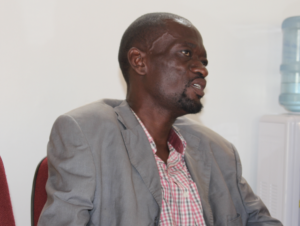Mozambique - Sousa Chilaule
Sousa Chilaule, 46, widower and father of a 23-year-old girl, has been living with HIV/AIDS for almost 20 years.
Even without confirmation of the diagnosis, he says that his wife, who died in 1998, “was a victim of HIV/AIDS as well”.
The story of Sousa begins in 1995, when he started having repetitive episodes of malaria and Tuberculosis. In 1999 he was diagnosed with TB for the second time and that was when he was advised to take the HIV test.
“Not only I did not take the HIV test but also I did not return to TB treatment”. He was afraid of the discrimination and stigma of that time, motivated, in his opinion, by the messages that were conveyed - "HIV kills you”; "where is John? -AIDS took him away".
Six months later, he returned to the Health Unit in a very serious and completely dependent state. He only knew about his positive HIV status in 2000, and he became desperate when he heard that there were no disease treatment drugs in the country and no way to monitor his progress -"It was very painful to hear the doctor say that there was nothing else to do for me".
He received full support from his family members when they became aware of his situation, but he did not find that support from the community. Even without revealing his diagnosis, everyone -neighbours, friends and colleagues- were already pointing at the fact that he had AIDS.
In public places, people would walk away. In the church, no one would agree to sit next to him. He experienced dramatic scenes of stigma, discrimination, violence and even destruction of his house because of being HIV positive.
"I lost my job because of my illness"
His former boss kept on asking what illness he was suffering from, and since he did not confirm it, eventually he was expelled from the company allegedly because he had a lot of work pending and people were no longer trusting him -since he did not reveal his illness-.
In 2003, with the arrival of treatment in the public sector, it was one of the first to start antiretroviral treatment (ART) due to its serious condition.
This onset was preceded by a long, bureaucratic and painful process of counselling and preparation that took about 6 months. It was common for him to get an appointment and find out that the patient who had been with him in the previous consultation had passed away.
After starting the treatment, he had two very difficult months of adaptation to the side effects of the medications but, motivated by the desire to continue living, he did not give up.
His state of health and appearance improved greatly over the course of his life, having returned to work as an activist for 8 years. At the moment, he faces financial and food difficulties because he is no longer working.
“I have plans to return to work and create a new family”
“My advice to patients is to not be afraid of discrimination and to tell their family members about their health condition, as the family can support with the treatment”. He also recommends health authorities to find mechanisms to reduce the waiting time to get the medicines so that people living with HIV in Mozambique can lead healthy and productive lifes.
WHO Consultant
Tel: +41 78 836 6193
Communications Manager
WHO Regional Office for Africa
Email: okas [at] who.int (okas[at]who[dot]int)
Tel: +242 06 508 1009



